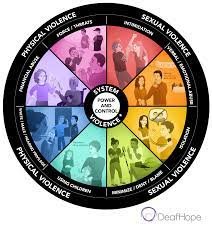Domestic Abuse and Barriers for Deaf Survivors
Domestic Abuse and Barriers for Deaf Survivors
In the UK, the term 'deaf' is used to refer to all levels of deafness. People who describe themselves as deaf are likely to be profoundly deaf.
The ‘uppercase D’ Deaf is used to describe people who identify as culturally Deaf and are actively engaged with the Deaf community. Deaf with a capital D indicates a cultural identity for people with hearing loss who share a common culture and who usually have a shared sign language. People who identify as Deaf have Sign Language as a primary language.
Sharing information and highlighting issues impacting Deaf women and domestic abuse should not be a conversation for us only during Deaf Awareness Week. Within discourses and conversations about intersectionality it is important we keep the Deaf community in mind and raise awareness and discuss issues impacting marginalised communities.
Sadly, the lived experiences of Deaf and deaf blind survivors, and survivors with disabilities going through violence and abuse are often ignored, It is important to understand the intersectional inequalities.
Women who are Deaf and /or have disabilities are 2 to 4 times more likely to experience domestic violence than hearing or able bodied women. Around 22 Deaf women are at risk of abuse every day. In spite of this, Deaf survivors face significant barriers accessing support. Currently in the UK, aside from London and the South East, which is served by SignHealth Domestic Abuse Service, there is no specialist service offering culturally and linguistically accessible support for Deaf survivors (although there are a couple of areas where support is in development.)
Deaf people commonly experience barriers accessing healthcare, affecting physical and mental health support. Around 90-95% of Deaf people are born into hearing families, and are often isolated due to communication deprivation, which has been shown to impact mental and emotional health in later life. Attitudes based in audism (hearing supremacy) are common throughout healthcare and support services.
Written English is not accessible to all people with Sign Language as a primary language. The lack of accessible Sign Language information makes it more difficult for Deaf women to understand and recognise abuse and to access support. This leads to higher risks of Deaf women being subjected to domestic abuse, including financial abuse, forced marriage and Honour Based Violence. LGBTQIA Deaf people can face even more barriers to support.
In our Building Bridges Conference one participant highlighted it very aptly,
"I am aware of the Deaf community may have a barrier as they struggle with their language let alone understanding their religion. Please can we not forget the deaf communities as well."
There are very few resources and information available about the impact of deafness on Black and minoritised women. This gap shows the need to highlight how Black, Deaf women continue to experience multiple oppressions due to their race, Deafness, and sexist practices that prevail amid systemic barriers, and male dominated culture.
There are powerful arguments for the need for specialist by and for services for the Deaf community which can be accessed equally throughout the UK providing Sign Language based, culturally informed support. Deaf survivors include many extremely vulnerable and complex cases, especially from non-British born and from Black and minoritized communities. There are extra barriers and vulnerabilities for Deaf people from ethnic communities coming to UK especially of they have minimal language skills and no education.
Deaf women are vulnerable to being enticed abroad to marry Deaf or hearing partners who could use this as an opportunity to get British citizenship or permanent visas. It could happen that abuse escalates once the abusive partner is settled.
At times Deaf women seeking support due to abuse could feel reluctant due to fear of their safety being compromised as their perpetrators could locate or find them through mutual friends as they are small community. It is also common that Deaf perpetrators use their Deafness as an excuse to avoid prosecution, at times court cases often dropped due to no interpreters available.
We all have to ensure that we listen to Deaf women’s needs and make the services inclusive. We all need to do more for Deaf community to feel included and provide accessible services.
Effective support needs to be able to meet the varied communication needs of d/Deaf women, which may include a mixture of British Sign Language, Sign Supported English, lipreading, hearing aids or cochlear implants. It also, crucially, needs to understand the culture of the Deaf community, the challenges of fleeing abuse within a small community, and the history and trauma associated with communication deprivation and audist oppression.
Marie Vickers, Domestic Abuse Service Manager, SignHealth has highlighted it very powerfully,
"If the pandemic taught us anything it would be the importance of Deaf Awareness and making services accessible. Deaf people have been more isolated due to pandemic because many services became inaccessible due to contact being dependant on phone calls and the use of facemasks prohibiting lip- reading. Deaf people may be trapped in abusive relationship as they have no way of seeking support. This is unacceptable and we hope by working together we can improve this situation and save lives."

Written for The Faith and VAWG Coalition by Aasifa and Nikki
For specialist support please do contact:
Sign Health Domestic Abuse Service https://signhealth.org.uk/with-deaf-people/domestic-abuse/
Deaf4Deaf counselling service www.deaf4deaf.com
Signs of Hope Deaf counselling service signsofhope@rcdow.org.uk